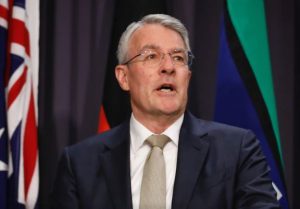Labor’s pledge on anti-discrimination
Federal Attorney General Mark Dreyfus has laid out the government’s anti-racism strategy in major speech this month.
Delivering the Australian Human Rights Commission’s annual Kep Enderby Memorial Lecture, Mr Dreyfus said “Australia’s continued success as a multicultural nation must include an ongoing commitment to addressing racism”.
He committed to restoring the integrity of Australia’s anti-discrimination framework and the independence of the Australian Human Rights Commission, First Nations justice, and a national anti-racism strategy.
“I said in my First Speech to the Australian Parliament in 2008, ‘tolerance lies at the heart of our Australian multiculturalism’. And, of course, tolerance can go a long way to preventing division and conflict,” Mr Dreyfus said.
“With the benefit of time and reflection I have come to believe that we must do more than ‘tolerating’ our differences,” he said.
“I feel that it is in the open-hearted acceptance and genuine appreciation of difference, rather than the mere tolerance of it, that the foundations of a truly multicultural and diverse society must rest. From this position, we will not just tolerate people from other cultures and religions, but actively seek to understand, accept and welcome people.
“We can also do more than creating a framework for complaints and conciliation of claims of racism or racial hatred,” Mr Dreyfus said.
“The anti-racism strategy will develop a shared understanding of racial equality to build support for an inclusive national narrative in which the rights of all people are protected and promoted, regardless of race, ethnicity or cultural background,” he said.
The strategy will include two major streams of work.

Mark Dreyfus
Firstly, a National Anti-Racism Framework will be established, intended to support the commitment of government, civil society and business and the community to tackle racism and promote racial equality in Australia.
The second aspect of the strategy is a national public awareness and educative campaign under the existing ‘Racism. It Stops with Me’ banner.
“Racism has a significant economic, social and national impact on Australia and the Government is committed to combatting racism and its impacts,” Mr Dreyfus said.
“We are committed to maintaining the integrity of our anti-discrimination framework, and ensuring it continues to meet the needs of the Australian community today. This is in keeping with the legacy handed down and expanded upon by Australian Labor governments of generations past,” he said.
Mr Dreyfus pointed to evidence of a resurgence in racism in recent times in outlining the need for an anti-racism strategy.
“There was a 14 per cent increase in complaints made under the Racial Discrimination Act 1975 prior to the pandemic from 2017 and 2019. During the pandemic, between 2018 and 2021, there was a significant 57 per cent increase in complaints,” Mr Dreyfus said.
“We continue to hear allegations of race-based misconduct across sporting codes and within workplaces and in other aspects of public life. The Government condemns racism without reservation,” he said.
And, he spoke of his personal motivations in addressing discrimination and racism.
“Like so many Australians, to me, this issue is deeply personal. My father, his brother, and their parents, were forced to flee from Nazi Germany for the simple reason that they were Jewish,” Mr Dreyfus said.
“My great-grandparents could not be convinced to leave. They died in the Holocaust.
“My family’s story, as well as the broader history of the Jewish people, informs my work as Attorney-General today.
“It is a history, personal and cultural, that ensures that I have undying gratitude to this nation and to its generous people for taking in my father, his brother and my grandparents in their time of desperate need.
“It is a history that makes me appreciative of the wonderful diversity of this nation and the need to continually protect that diversity. It reinforces the need to uphold and, where possible, to strengthen the fundamental human rights in which that diversity flourishes.”
Mr Dreyfus said Australia’s continued success as a multicultural nation must include an ongoing commitment to addressing racism.
“The Government takes this obligation very seriously. The first step towards bringing our anti-discrimination protections in line with community expectations is to recognise that the integrity of this framework is dependent upon the proper functioning of, and support for, an independent Australian Human Rights Commission,” he said.
In the lecture, Mr Dreyfus also touched on the contentious issue of Section 18c of the Racial Discrimination Act.
Section 18C of the Racial Discrimination Act makes it unlawful to do an act otherwise than in private that is reasonably likely to offend, insult, humiliate or intimidate people because of their race, colour or national or ethnic origins.
“Despite the important protections provided by section 18C, the provision been repeatedly attacked by Coalition governments since 2014.” Mr Dreyfus said.
He said Labor would continue to oppose any attempts to water down legal protections against race hate speech.
“Australia is home to people who can proudly claim ancestry from our oldest continuous cultures, and people who identify with more than 270 cultures who have come to this land and greatly enriched us all,” Mr Dreyfus said.
“Combatting hate speech helps all Australians feel protected and at home in this country,” he said.
The Kep Enderby Memorial Lecture is an annual public event held by the Australian Human Rights Commission to honour the memory of the Hon Kep Enderby QC. As Attorney-General, Kep Enderby introduced into Parliament the Bill which would become the Racial Discrimination Act 1975.












